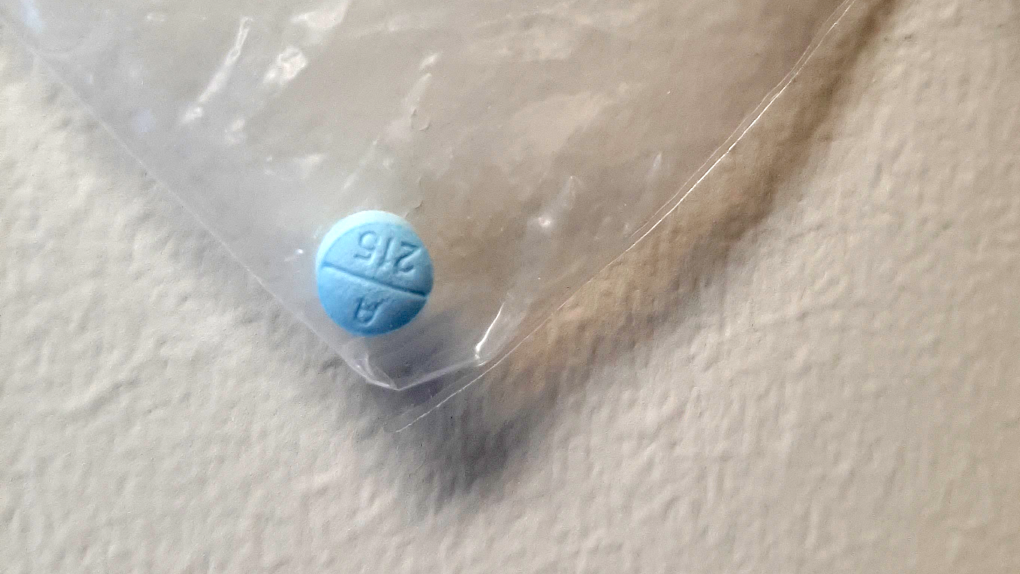Montreal boy, 15, killed by drug more potent than fentanyl
The family of a 15-year-old boy is warning others to beware after he died taking isotonitazene, a drug considered more potent than fentanyl.
Mathis Boivin died on Dec. 21 after ingesting the synthetic opioid.
"We warned him. I made him read articles. I told him, 'don't touch the little blue pills,'" his father, Christian Boivin, told Noovo Info.
Despite the tragedy, Mathis' father says he doesn't blame his child.
"We were all young once. I was a teenager too, I didn't listen to my parents either, but this poison didn't exist," he said. "If I were 15 today, I would be at risk, just like my son. I can't judge him on that."
The family reported the teen's death to Montreal police (SPVM) in the hopes of finding the person who sold him the drug.
"If there are young people who are hearing this, don't let them try it," said Boivin. "Don't even try it. It's too dangerous. It's poison."
The teenager apparently thought he was taking oxycontin.
Instead, at the price of $10 a tablet, he purchased a drug that has been found in the autopsies of 14 people since August 2020, according to the Montreal Public Health Department (DRSP).
In fact, the department issued an overdose alert in November 2020 about the circulation of tablets that look like oxycodone but actually contain isotonitazene.

This drug can appear in numerous forms, including tablets and powder, and carries a high risk of overdose.
"Use of this substance can cause respiratory distress up to and including respiratory arrest and even death," the DRSP stresses.
Naloxone can be used to reverse the effects of isotonitazene, but given its potency, more than one dose may be needed to save a person's life.
"He loved life so much," said his father. "He fell asleep and didn't wake up."
Mathis' funeral is slated to take place Friday.
CTVNews.ca Top Stories

opinion Tom Mulcair: Prime Minister Justin Trudeau's train wreck of a final act
In his latest column for CTVNews.ca, former NDP leader and political analyst Tom Mulcair puts a spotlight on the 'spectacular failure' of Prime Minister Justin Trudeau's final act on the political stage.
B.C. mayor gets calls from across Canada about 'crazy' plan to recruit doctors
A British Columbia community's "out-of-the-box" plan to ease its family doctor shortage by hiring physicians as city employees is sparking interest from across Canada, says Colwood Mayor Doug Kobayashi.
'There’s no support': Domestic abuse survivor shares difficulties leaving her relationship
An Edmonton woman who tried to flee an abusive relationship ended up back where she started in part due to a lack of shelter space.
opinion King Charles' Christmas: Who's in and who's out this year?
Christmas 2024 is set to be a Christmas like no other for the Royal Family, says royal commentator Afua Hagan. King Charles III has initiated the most important and significant transformation of royal Christmas celebrations in decades.
Baseball Hall of Famer Rickey Henderson dead at 65, reports say
Rickey Henderson, a Baseball Hall of Famer and Major League Baseball’s all-time stolen bases leader, is dead at 65, according to multiple reports.
Arizona third-grader saves choking friend
An Arizona third-grader is being recognized by his local fire department after saving a friend from choking.
Germans mourn the 5 killed and 200 injured in the apparent attack on a Christmas market
Germans on Saturday mourned the victims of an apparent attack in which authorities say a doctor drove into a busy outdoor Christmas market, killing five people, injuring 200 others and shaking the public’s sense of security at what would otherwise be a time of joy.
Blake Lively accuses 'It Ends With Us' director Justin Baldoni of harassment and smear campaign
Blake Lively has accused her 'It Ends With Us' director and co-star Justin Baldoni of sexual harassment on the set of the movie and a subsequent effort to “destroy' her reputation in a legal complaint.
Oysters distributed in B.C., Alberta, Ontario recalled for norovirus contamination
The Canadian Food Inspection Agency has issued a recall due to possible norovirus contamination of certain oysters distributed in British Columbia, Alberta and Ontario.


































